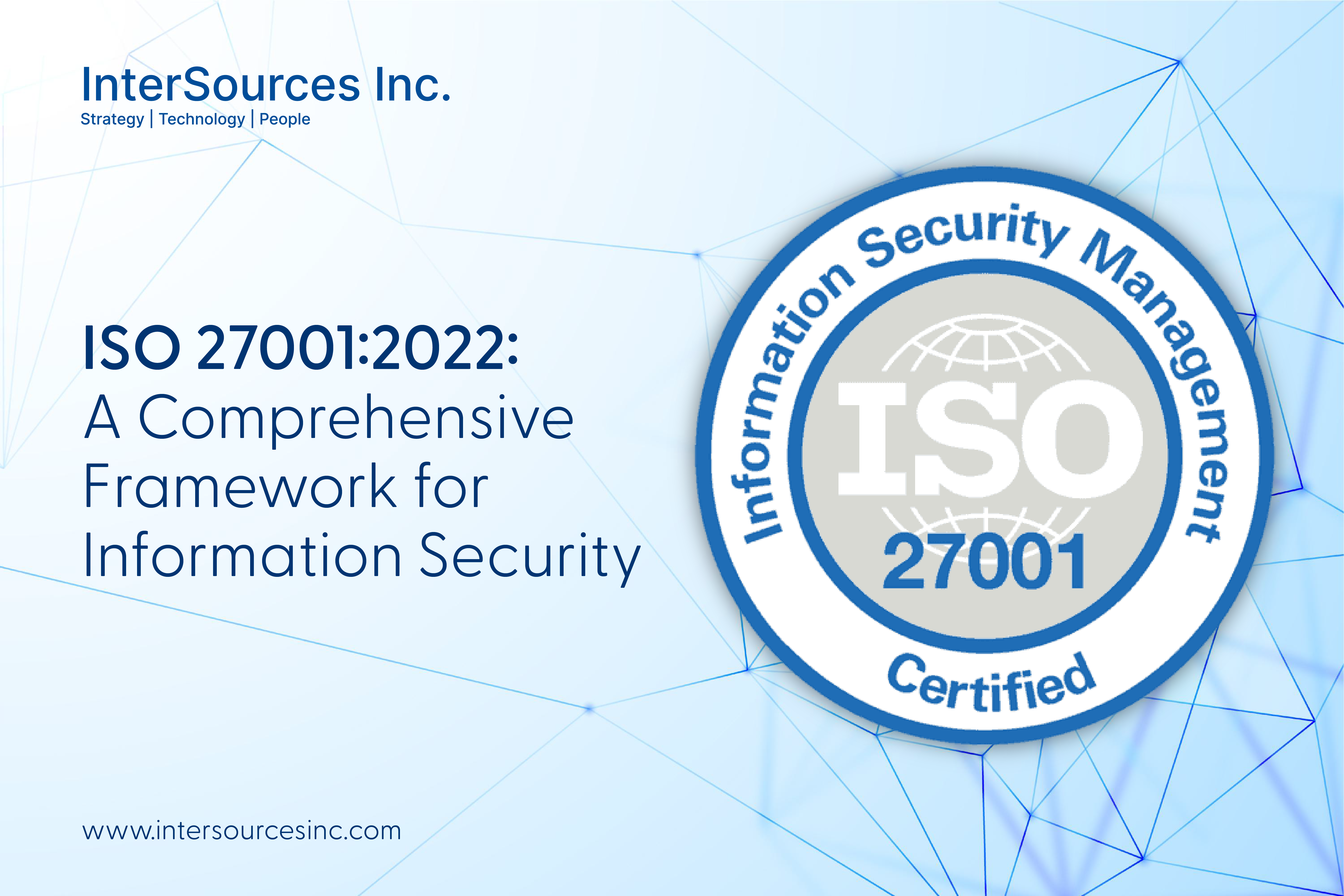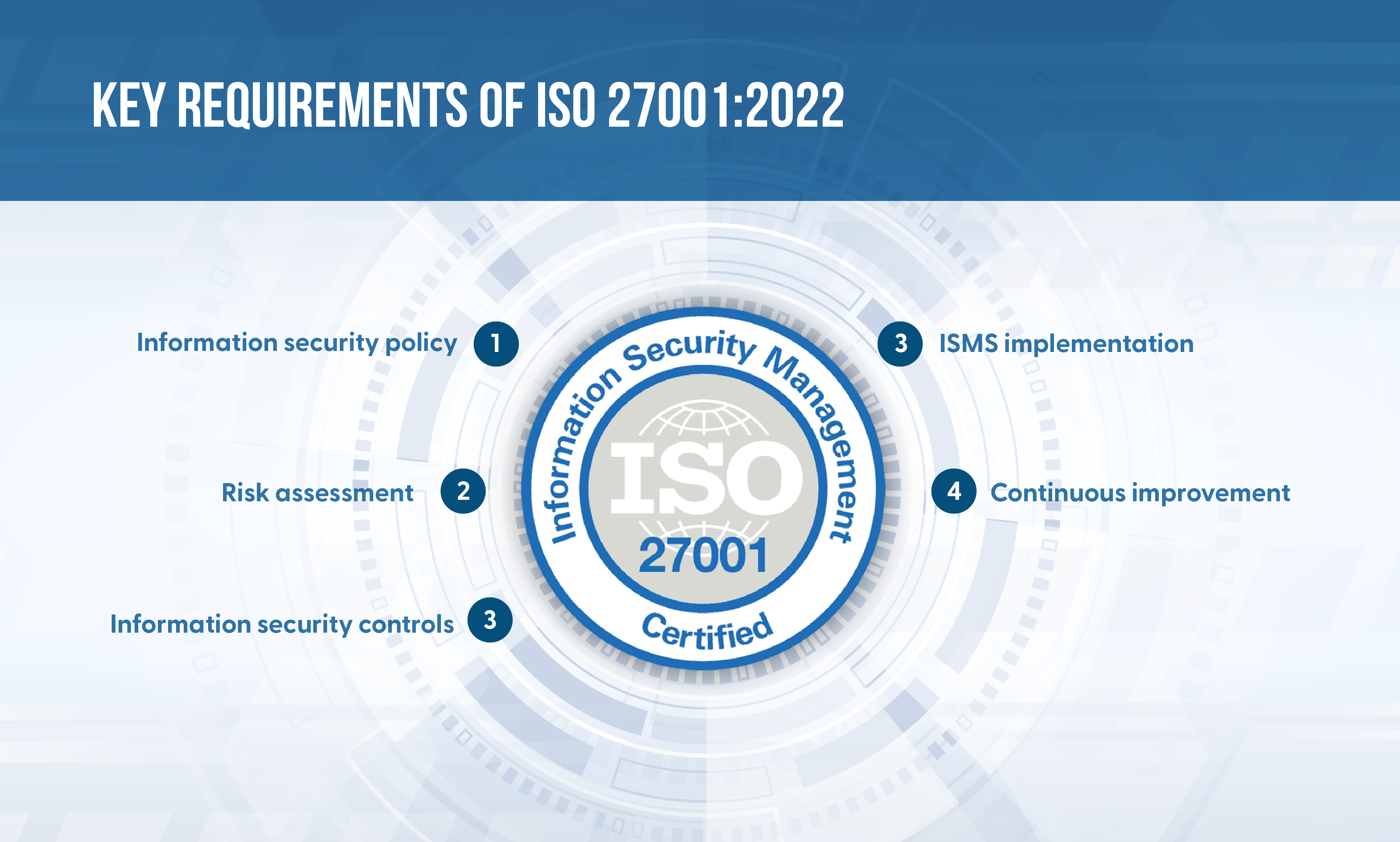← All Blogs

ISO 27001:2022: A Comprehensive Framework for Information Security
With cyber threats becoming increasingly sophisticated, organizations must proactively protect their sensitive information. In that sense, the best way forward for such organizations would be the implementation of the ISO 27001 standard. ISO 27001:2022 is a comprehensive framework designed to help organizations establish, implement, and maintain an effective ISMS (Information Security Management System).
This standard outlines a guide to help the organizations protect their precious data by improving trust and reputation. In this blog, we will discuss ISO 27001:2022, which are the main key benefits of ISO 27001:2022, and what makes it so important for your company's success.
Understanding ISO 27001:2022
What is ISO 27001?
ISO 27001 is an international standard that outlines the requirements for establishing, implementing, maintaining, and continually improving ISMS. ISO 27001 provides organizations with systematic management of sensitive information that ensures its confidentiality, integrity, and availability.
Core Principles and Concepts
Risk Management: It deals with identifying and assessing the risks associated with information security.
Continual Improvement: This refers to continual improvement in ISMS through regular reviews and updates.
Stakeholder Engagement: All parties whose interests are affected by the organization must be involved in information security efforts.
Key Requirements of ISO 27001:2022

ISO 27001:2022 is composed of a variety of clauses describing specific requirements for an ISMS. Some of the key areas covered include:
Information security policy: This policy outlines the commitment of the organization towards information security and clearly highlights the goals and objectives to be delivered in this regard.
Risk assessment: All organizations must carry out an overall risk assessment of cybersecurity that will enable them to detect latent threats or vulnerabilities on their information assets.
Information security controls: Such risk control can be in the form of technical, organizational, and physical controls. Organizations have to implement the right information security controls so that they can mitigate the risks.
ISMS implementation: Organizations should design and implement an ISMS which is in line with its business objectives and risk profile
Continuous improvement: The ISO 27001 standard emphasizes the importance of continual improvement. This process involves frequent reviews and updates of the ISMS to establish and reflect the changing threats as well as requirements..
Benefits of Implementing ISO 27001:2022
Implementing ISO 27001 can provide numerous benefits to organizations, including:
Enhanced reputation and trust: It helps the organization improve its reputation and inspire trust among its customers, partners, and stakeholders through ISO 27001 certification.
Mitigated risks: Following the framework, an organization will be able to identify and eliminate impending risks to the information assets of the organization, thereby reducing data breaches and cyberattacks.
Improved operational efficiency: ISO 27001 implementation helps the organization streamline their activity systems and subsequently improve operational efficiency through standardized procedures and processes.
Cost savings: In the long run, ISO 27001 will save costs owing to avoid costly data breaches and proactive security measures
Challenges and Considerations
ISO 27001 undoubtedly helps an organization, but should be brought to balance the challenges that organizations face while putting these standards into place. These challenges include:
Top management commitment: Successful implementation of ISO 27001 requires strong commitment from top management.
Resource allocation: Organizations have to allocate ample time, budget and manpower to implement and maintain their ISMS.
Cultural change: ISO 27001 may demand an organizational culture change since it stresses a proactive approach towards information security.
The ISO 27001:2022 Certification Process
Organizations wishing to become ISO 27001 certified must undergo a strict auditing process at the hands of a certified certification body. The process typically involves the following steps:
Initial assessment: The certification body checks the organization's readiness for certification through a first audit.
Gap analysis: If the organization is not fully compliant, the certification body will indicate the gaps existing in its ISMS.
Corrective actions: Based on the identified gaps, the organization has to take corrective actions.
Surveillance audits: Organizations under the process of certification will experience surveillance audits at regular intervals to ensure continuing conformity.
Case Studies and Best Practices
Real-World Examples
Many organizations have implemented ISO 27001 and then enjoyed the fruits of better security and trust. A financial services company, for instance, reduced data breach incidents by 70 percent after becoming ISO 27001 certified.
Best Practices
Tailor ISO 27001 to Your Needs: Modify the framework to suit your organization's specific risk profile and business objectives.
Engage Employees: Encourage a culture of security awareness through regular employee training and communication.
Monitor and Review: Keep monitoring and reviewing your ISMS to ensure continued compliance and improvement
Take the Next Step Towards ISO 27001 Certification with InterSources Inc.
ISO 27001 certification is not a walk in the park, but it need not be a solitary journey either. We at InterSources Inc. handle all the certifications to ensure the organization comes out on the right side of the process.
Despite the challenges, we can assist you with the right expertise and support. To do so, organizations can successfully navigate the certification process and strengthen their information security posture, positioning themselves for future growth and success.
Our expert team will help you:
Carry out extensive gap analysis in order to identify the improvement areas.
Design and implement an Information Security Management System (ISMS) especially tailored to your requirements.
Train and enable team members to understand how pivotal information security can become.
Prepare yourself boldly for audits whether these are internal or external.
Explore more to learn how we can help you achieve ISO 27001 certification and enhance your organization's resilience!
